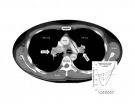(Press-News.org) Studies in animals have raised concerns that tumors may grow faster after the anticancer drug sunitinib is discontinued. But oncologists and physicists who collaborated to analyze data from the largest study of patients with kidney cancer convincingly demonstrate that such tumor acceleration does not occur in humans. The findings, publishing online on February 7th in the Cell Press journal Cell Reports, suggest that sunitinib does not cause lingering risks for patients after their treatment ends.
"We were able to demonstrate that this applied across all patients and that those who had the greatest benefit from the drug while it was administered retained this benefit," says senior author Dr. Tito Fojo, of the National Cancer Institute at the National Institutes of Health.
Sunitinib, which is approved around the world for the treatment of several different cancers, works by targeting proteins on the blood vessels that feed tumors. Animal studies have suggested that treatment with sunitinib may induce changes in tumor vessels or adaptations within tumors themselves that could promote cancer growth and spread.
When Dr. Fojo and his colleagues analyzed more than 10,000 data points from the pivotal randomized phase 3 clinical trial that led to sunitinib's approval, the evidence clearly showed that no matter how long patients took sunitinib, it was not harmful, did not accelerate tumor growth, and did not shorten survival after treatment ended. During treatment, the drug slowed tumor growth and prolonged the patients' survival.
"Last year, I was approached by two patients who had grave concerns about taking sunitinib due to an article conducted in animals. I realized that if clinical data exist that refute basic science, they must be published," recalls Dr. Fojo.
The researchers' findings indicate that sunitinib can benefit patients without altering tumor biology after the drug is stopped. "We hope this can be generalized to similar drugs but recognize that further studies will be needed," says first author Dr. Krastan Blagoev of the National Science Foundation. "Nevertheless, other drugs also approved worldwide for a variety of cancers—including sorafenib, pazopanib, and axitinib—are similar to sunitinib, and this will give some reassurances that one need not expect things to get worse after such drugs are discontinued."
INFORMATION:
Cell Reports, Blagoev et al.: "Sunitinib Does Not Accelerate Tumor Growth in Patients with Metastatic Renal Cell Carcinoma."
Reassuring evidence: Anticancer drug does not accelerate tumor growth after treatment ends
2013-02-07
ELSE PRESS RELEASES FROM THIS DATE:
Hopkins researchers uncover key to antidepressant response
2013-02-07
Through a series of investigations in mice and humans, Johns Hopkins researchers have identified a protein that appears to be the target of both antidepressant drugs and electroconvulsive therapy. Results of their experiments explain how these therapies likely work to relieve depression by stimulating stem cells in the brain to grow and mature. In addition, the researchers say, these experiments raise the possibility of predicting individual people's response to depression therapy, and fine-tuning treatment accordingly. Reports on separate aspects of the research were published ...
Treatment with clot-busting drug yields better results after stroke than supportive therapy alone
2013-02-07
In an update to previous research, Johns Hopkins neurologists say minimally invasive delivery of the drug tPA directly into potentially lethal blood clots in the brain helped more patients function independently a year after suffering an intracerebral hemorrhage (ICH), a deadly and debilitating form of stroke. Rates of functional recovery with the active tPA treatment far surpassed those achieved with standard "supportive" therapy that essentially gives clots a chance to shrink on their own.
In the current Johns Hopkins-led study, ICH patients who randomly received the ...
Clot-retrieval devices failed to improve stroke-related disability
2013-02-07
A stroke survivor's chances of living independently after 90 days are not improved by the use of devices inserted into the artery to dissolve or remove a stroke-causing clot shortly after the onset of symptoms, according to a randomized controlled trial involving 656 patients.
The study, funded by the National Institute of Neurological Disorders and Stroke (NINDS), part of the National Institutes of Health, compared the intra-arterial device-based approach plus the current standard of intravenous (IV) tissue plasminogen activator (t-PA), a clot-busting drug with IV t-PA ...
In the brain, broken down 'motors' cause anxiety
2013-02-07
VIDEO:
This video (S3 in the paper) shows the transport defect of the serotonin receptor in a KIF13A knock out neuron compared with a wild type neuron.
Click here for more information.
When motors break down, getting where you want to go becomes a struggle. Problems arise in much the same way for critical brain receptors when the molecular motors they depend on fail to operate. Now, researchers reporting in Cell Reports, a Cell Press publication, on February 7, have shown ...
Salmon may use magnetic field as a navigational aid
2013-02-07
CORVALLIS, Ore. – The mystery of how salmon navigate across thousands of miles of open ocean to locate their river of origin before journeying upstream to spawn has intrigued biologists for decades, and now a new study may offer a clue to the fishes' homing strategy.
In the study, scientists examined 56 years of fisheries data documenting the return of sockeye salmon to the Fraser River in British Columbia – and the route they chose around Vancouver Island showed a correlation with changes in the intensity of the geomagnetic field.
Results of the study, which was supported ...
Immune systems of healthy adults 'remember' germs to which they've never been exposed
2013-02-07
STANFORD, Calif. — It's established dogma that the immune system develops a "memory" of a microbial pathogen, with a correspondingly enhanced readiness to combat that microbe, only upon exposure to it — or to its components though a vaccine. But a discovery by Stanford University School of Medicine researchers casts doubt on that dogma.
In a path-breaking study to be published online Feb. 7 in Immunity, the investigators found that over the course of our lives, CD4 cells — key players circulating in blood and lymph whose ability to kick-start the immune response to viral, ...
Cells forged from human skin show promise in treating MS, myelin disorders
2013-02-07
A study out today in the journal Cell Stem Cell shows that human brain cells created by reprogramming skin cells are highly effective in treating myelin disorders, a family of diseases that includes multiple sclerosis and rare childhood disorders called pediatric leukodystrophies.
The study is the first successful attempt to employ human induced pluripotent stem cells (hiPSC) to produce a population of cells that are critical to neural signaling in the brain. In this instance, the researchers utilized cells crafted from human skin and transplanted them into animal models ...
Zinc helps against infection by tapping brakes in immune response
2013-02-07
COLUMBUS, Ohio – New research suggests that zinc helps control infections by gently tapping the brakes on the immune response in a way that prevents out-of-control inflammation that can be damaging and even deadly.
Scientists determined in human cell culture and animal studies that a protein lures zinc into key cells that are first-responders against infection. The zinc then interacts with a process that is vital to the fight against infection and by doing so helps balance the immune response.
This study revealed for the first time that zinc homes in on this pathway ...
Study shows disease spread in ladybirds with sexually transmitted disease
2013-02-07
A study at the University of Liverpool into the spread of sexually transmitted infection in ladybirds has shown that disease risk to large populations cannot be predicted without a full understanding of the disease dynamics at small geographical scale.
Scientists investigated a virulent form of infection in the central and northern European populations of the two-spot ladybird to understand the conditions that favoured disease spread. Researchers found that disease burden in two locations of the same habitat – the lime tree - were very different, despite being within ...
New technology may help doctors monitor concussions, aging, and neurological function
2013-02-07
Boston, MA, Feb. 7, 2013 – Doctors routinely track their patients' hand-eye coordination to monitor any neuromuscular deficits, particularly as patients age or when they are injured -- but the tests they have been using to track this kind of information may be subjective and qualitative.
Researchers at the Wyss Institute for Biologically Inspired Engineering at Harvard University, the Beth Israel Deaconess Medical Center, and Hebrew SeniorLife, Boston (BIDMC), recently completed the first clinical study of a new rapid neuroassessment device they developed to quantitatively ...


